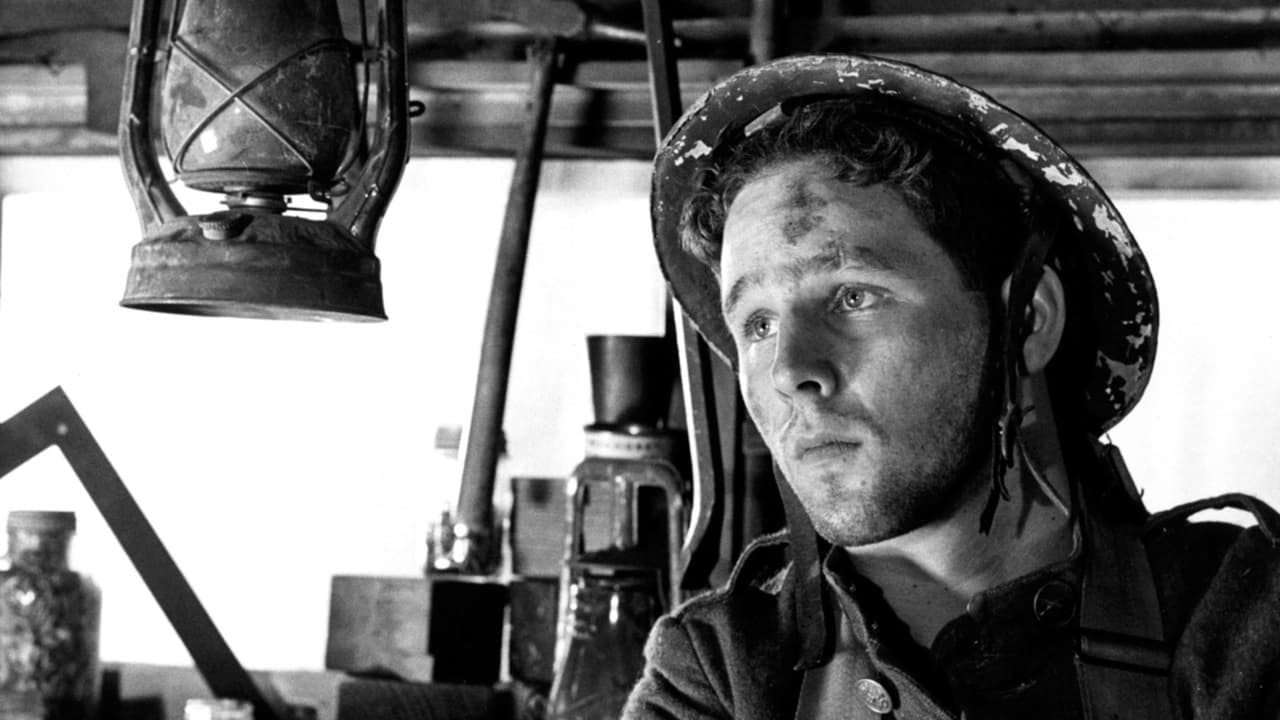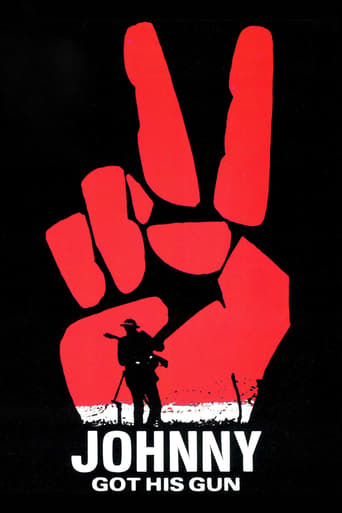

This film is almost hard to talk about. The Dalton Trumbo novel involves a man who has been dismantled in war. He is just a trunk and a head, with his body hanging on. He still has his sexual organs. He is immobile, of course, and dependent for everything on his caretakers. One young woman, a nurse, take pity on him and gives him a sexual experience. LIke any of us, he has dreams, but he is unable to express them to anyone. He needs stimulation but is kept in a dark room and approached on rare occasions. If there is a true nightmare, this would be it. The most devastating thing is that he is really young and will probably live a long time. We are kept involved with his thoughts through a kind of personal narration. It may be the saddest film I've ever seen.
... View MoreIn 1972 I was 16 and living on my own in NYC. The era was tumultuous and I was naive enough to believe that tumult was the norm. That time was tailor made for the vision of Trumbo. In a different but appropriate way, today is too. I had read JGHG in my HS freshman year and seeing the title on a marquee in Soho I bought a ticket.I won't remark on storyline or the skills brought to bear by the principals or dwell on how the ethos, pathos and logos of Trumbo's piece are resonant now as then.I will relay this information. I left that theater shattered. I knew the story, the book was faithfully translated to the screen albeit abbreviated. Nonetheless the delivery of JGHG on screen affected me to a degree that no other single piece did before or has since. I am a middle aged man now with grandchildren, and the uncle of young men who served in foreign wars. I have yet to reconcile my disdain for people who take advantage of their positions to send our children to their deaths with my understanding that some things are worth our blood and treasure. We each carry our own unique moral baggage to our concepts of war. My baggage was made manifest at an afternoon matinée one rainy day in 1972, almost 40 years ago but cemented in my psyche. This is my testimony to the power of Dalton Trumbo's work.In case the magnitude of its impact has not been strongly enough emphasized here, I should note that I have had a copy of JGHG in my film library for some time but have not watched it. I just can't bring myself to go through that again as there is no cathartic effect or anything approaching relief to be had.
... View MoreVietnam determinedly enlightens Dalton Trumbo's repossession of old ground in the era of MASH and Catch-22. Trumbo's Johnny is, yes indeed, a guy named Joe, once a baker supporting his family, smitten with gentle Teresa Wright or Greer Garson-style girl, who joins the army because, why, "it's the sort of thing a fella oughta do, when his country is in trouble." All these familial figures are in essence Norman Rockwell collectibles. What a contrast when, in the trenches, he's sent on a round to hide a carcass that affronts a colonel's sense of smell. A shell lands near him. This is his last memory before he, regrettably, awoke, in a hospital.The army is satisfied he has no cognizant mind. They resolve to keep him breathing only to study him. But he's cognizant all right, and little by little he becomes so of the horror of his wounds. He's literally captive within his mind, for a desperate eternity to anyone with no available concept of time, until he discovers a way of communicating with a compassionate nurse. Trumbo avails himself of a brilliant fast-cutting sequence, in a sense the sort one frequently sees in edgy late '60s and early '70s movies, but a particularly incisive and acute portrayal of mental disorientation, Bottoms struggling to organize his new life's routine without the aid of any physical outlet, no anchor for his thoughts, struggling to file them with constant bewildering disturbances and loss of bearings. Even telling day from night is a mystery for him to solve.The upsetting premise benefits from Paths of Glory, La Jetée and the story of Helen Keller, but in no way does he tell his story in anything but the most inimitable way. Never before or since this film have we seen anything much like it. Because of Trumbo's determination to render the most exacting possible depiction of Bottoms' unique perception, there is even a transitional effect unique to this film, a fade to yellow when he feels the sun for the first time since his injuries. This truly unique work also unearths probably the most inventive use of voice-over I might've ever heard: He describes people we see as vibrations. When two nurses enter, he claims that now there are two vibrations. In a clever smidgen of much-needed levity, one nurse is fat, and he supposes it's a man.A story that authentically imparts the loneliest possible consciousness, one where the subject can't even be sure whether or not he's alive, Trumbo draws on flashbacks and flights of a deserted, despairing imagination to make Joe alive for us, as he subsists in a living death. Evincing what could perhaps be argued as a level of bitterness in respect to the filming of Trumbo's human war tales in the past, or simply a yearning for the naivete of the old days, some memories and fantasies recreate the 1940s melodrama use of music, soft lens, close-ups and prosy dialogue. Then we find some of the brutal realities of real-life scenes are muted by some of that classic technique after awhile as well. The most pleasant flashback is the first, when Joe and his girl kiss in her living room and are cut short by her father, who sends them to her room, where there's a love scene of such softness and splendor that its resonance ring through the whole film. Representing Trumbo's own awe at his character is Donald Sutherland's Jesus, who counsels Joe in a celestial milieu more akin to how Trumbo might've truly wanted to portray the same fantasy in A Guy Named Joe over thirty years before.Christ actually doesn't have much to put forward. He has no solutions because there are none. Indeed, the film closes with no political answers and without, as a matter of fact, even a political outlook. It purely presents a set of circumstances. Here was a loyal young American who went off and was hideously injured for no grand cause, and whose alert mind lives on as a staggering condemnation of powers that be who sent all the young men away to do this to one another.
... View MoreOn the last day of Word War I, a soldier named Joe (Timothy Bottoms) is hit by an artillery shell that doesn't kill him but destroys all of his limbs, face, vision, hearing and ability to speak. He wakes up in a hospital where he can feel people's presence in the room by the vibrations they make on the floor but cannot communicate with them in any way, causing him extreme anxiety. All he has left is his imagination which he uses to revisit his sometimes surreal memories of his childhood and youth, remembering especially his father (Jason Robards), girlfriend (Kathy Fields) and deceased army buddies. He also has conversations with Jesus himself (Donald Sutherland), but not even He seems to know how to help.The contrast between reality and Joe's dreams is marked by switches from black & white to colour. In the hospital room we can hear Joe's desperate voice trying to make contact with the doctors and nurses who either don't pay attention or just can't understand him. Only one of the nurses (Diane Varsi) truly wants to see him as a human being anymore. It's very easy to feel his pain and hearing him begging the doctors via Morse code to either make him a public demonstration of the horrors of war or just kill him is one of the most effective anti-war scenes ever. The very last scene should haunt the audience for a long time after the film has ended.Even though a bedridden shadow of a man sounds like an unlikely subject for a film, Johnny Got His Gun succeeds excellently. The anti-war message is heavy, but what other kind of message can you have about a world war? The heart-breaking story, diverse visual style, steady direction and strong performances by Bottoms, Robards and Varsi make the film a powerful work of art. It is one of the best war films I've seen and I'll recommend it to anyone looking for an effective cinematic experience in any genre.
... View More